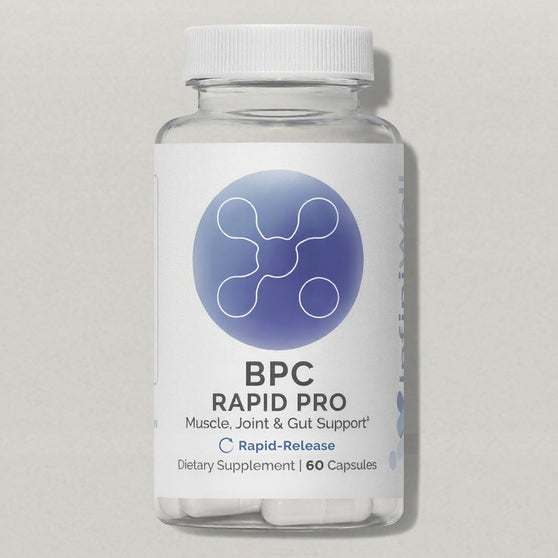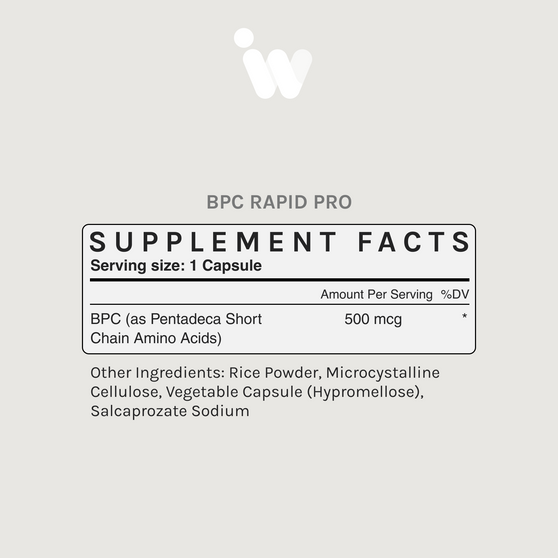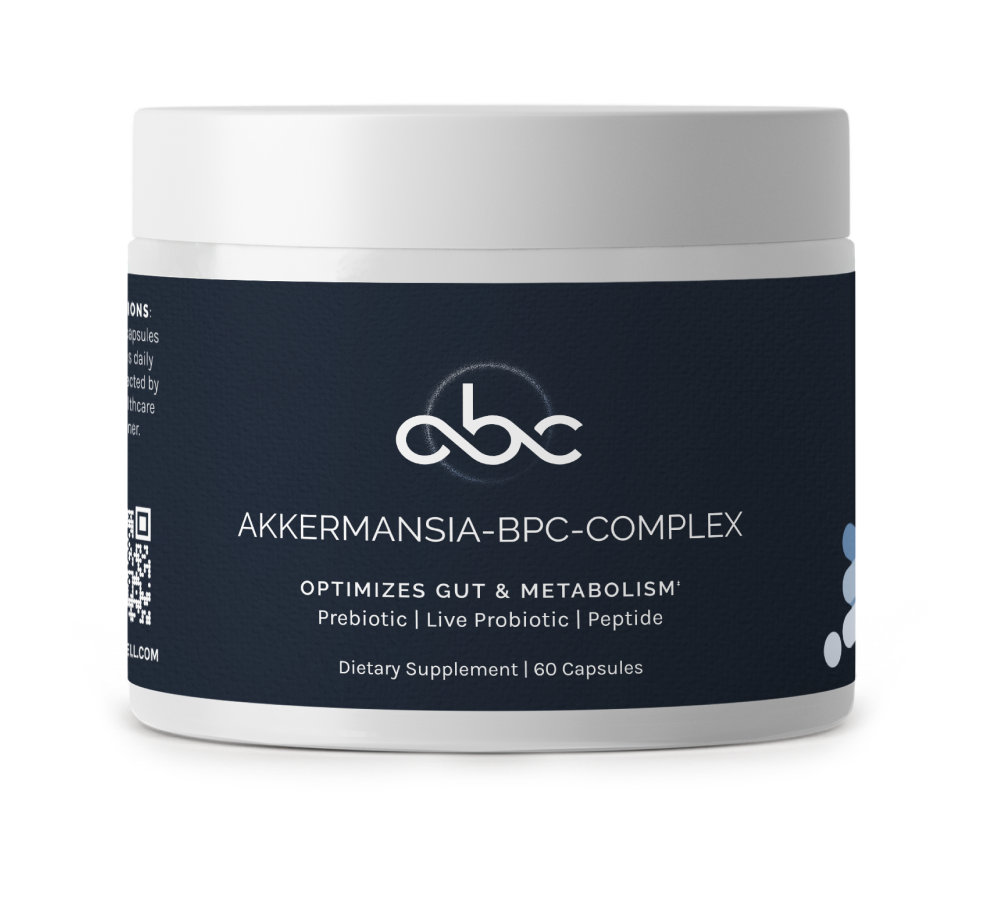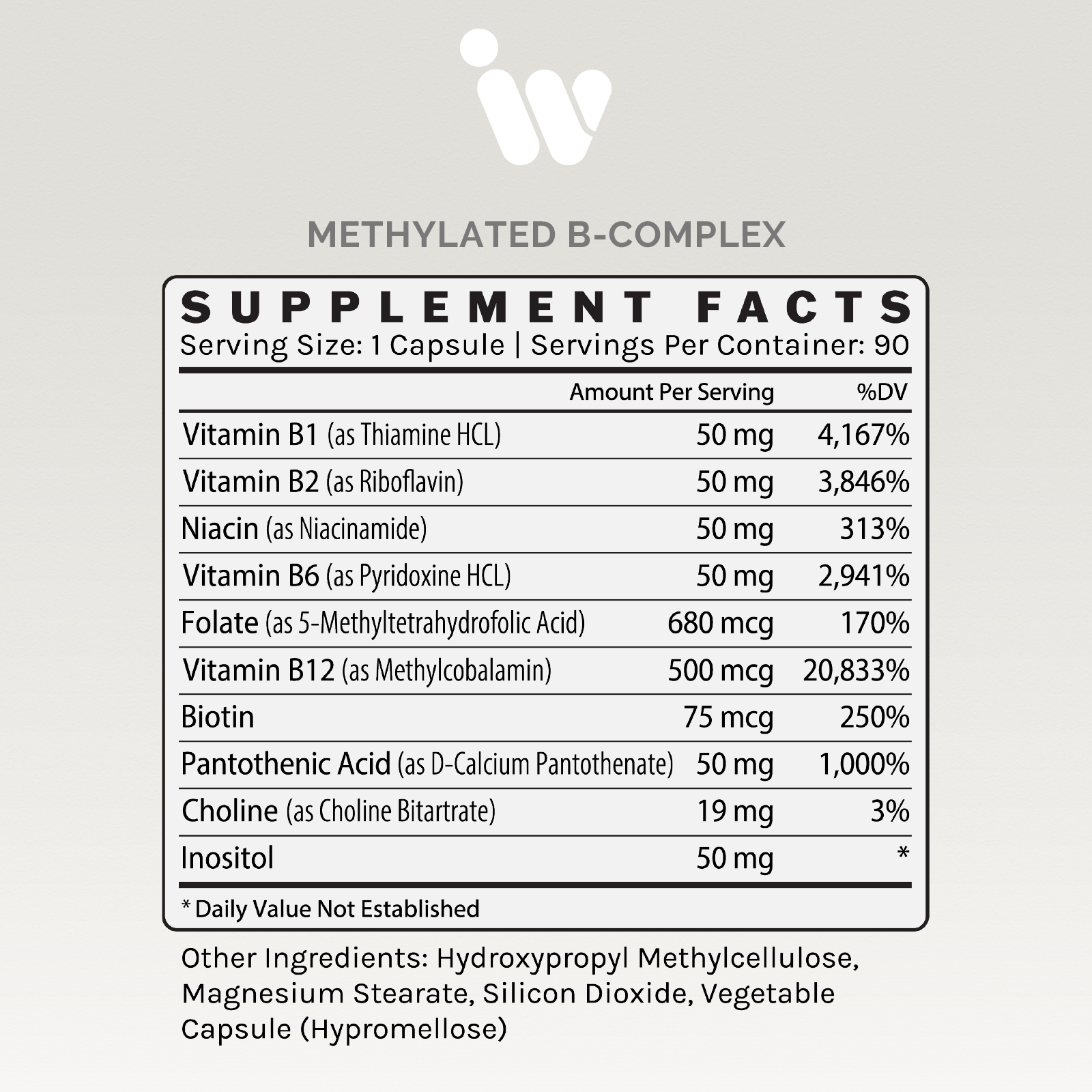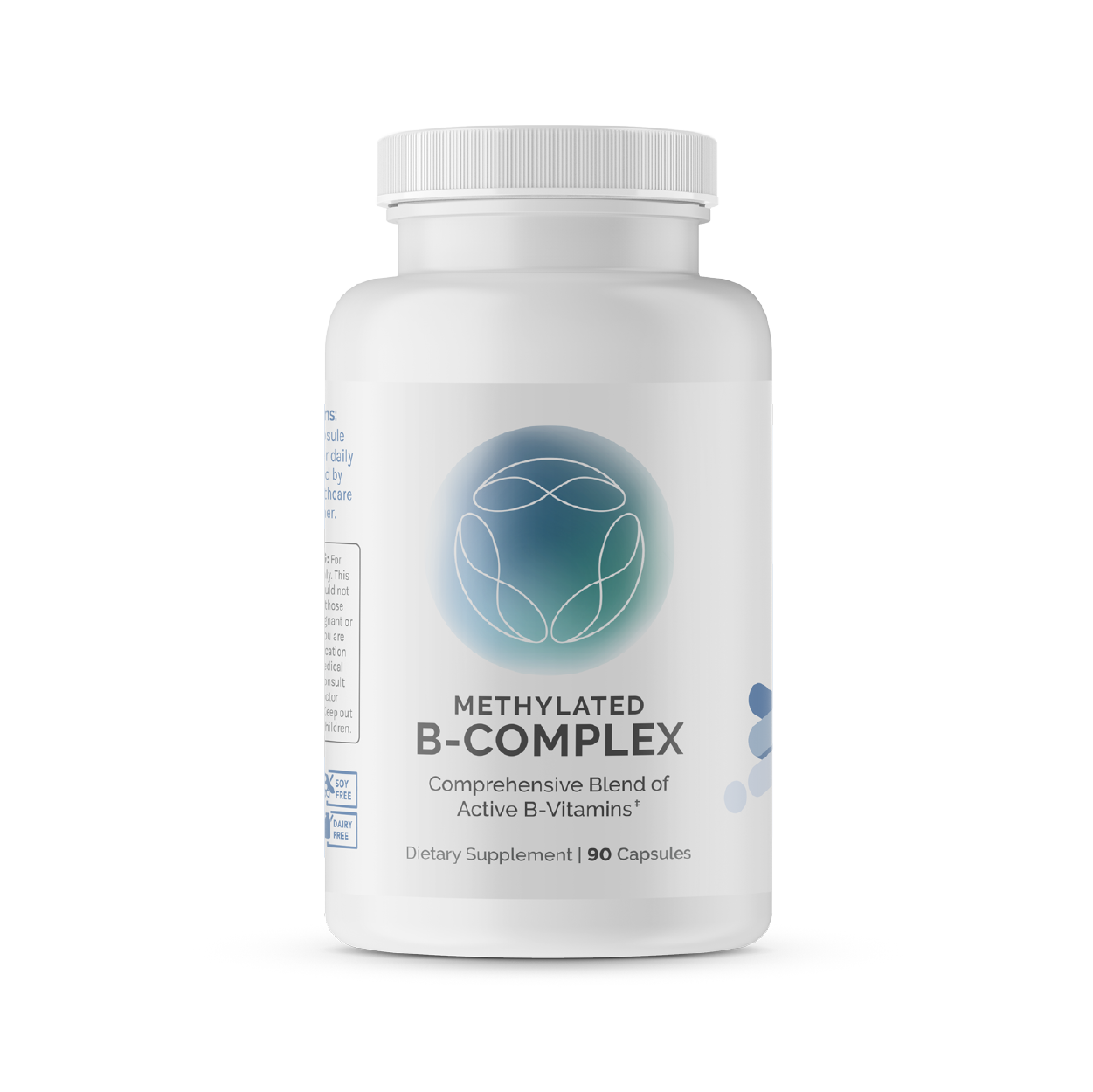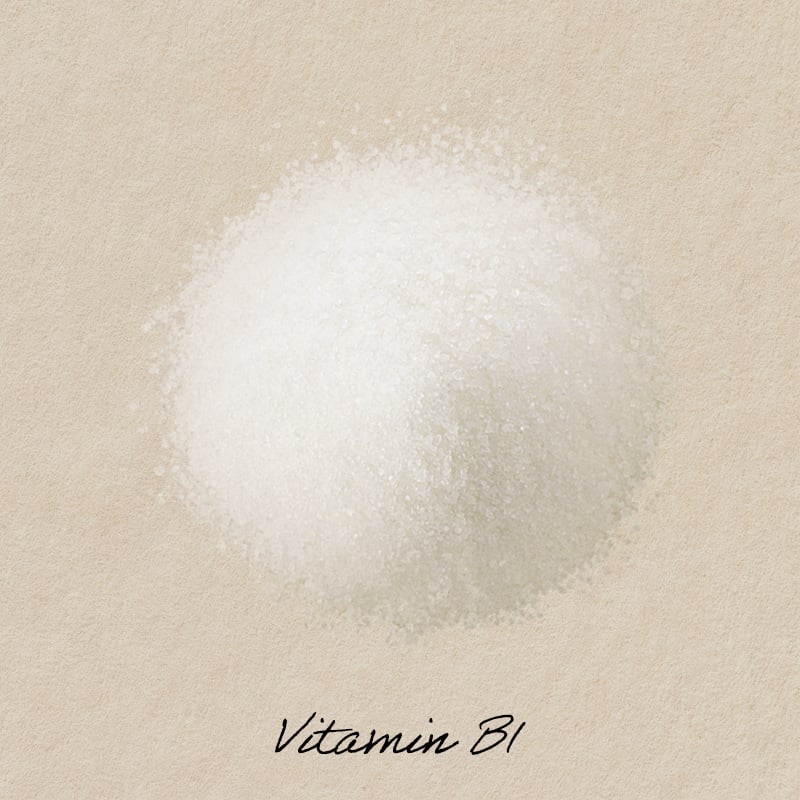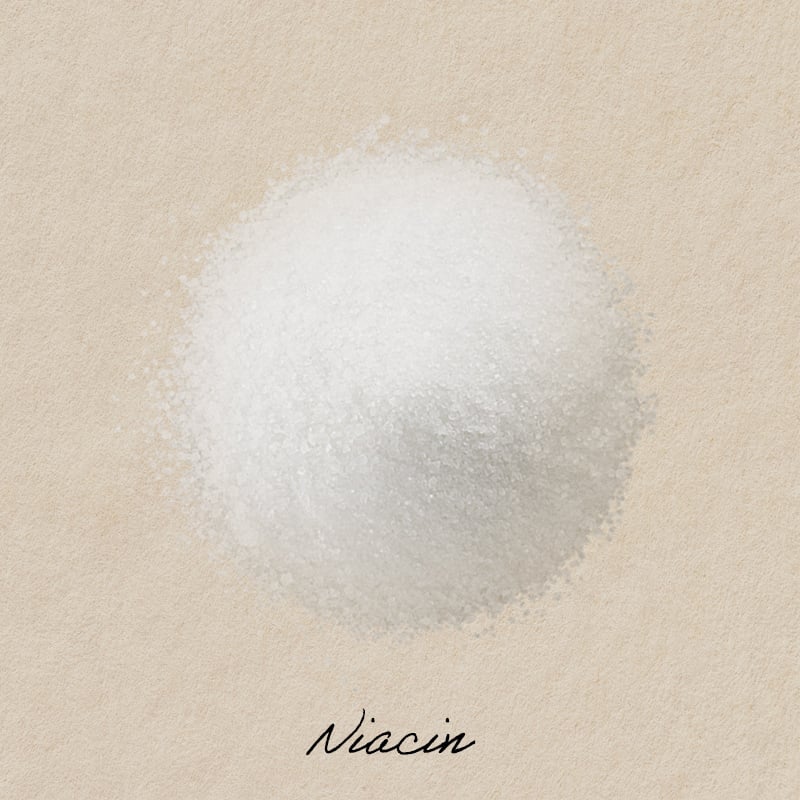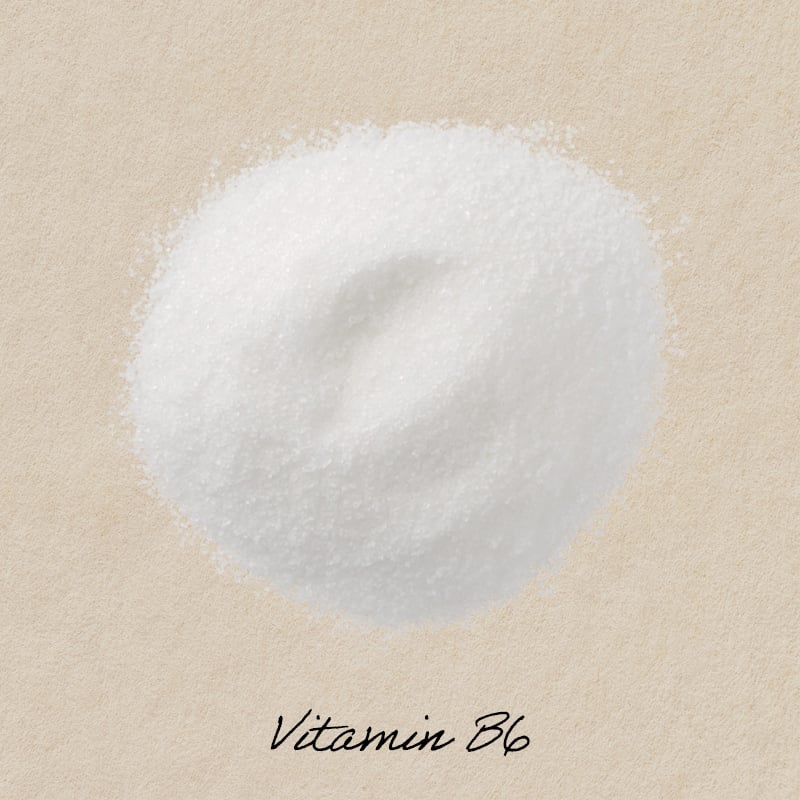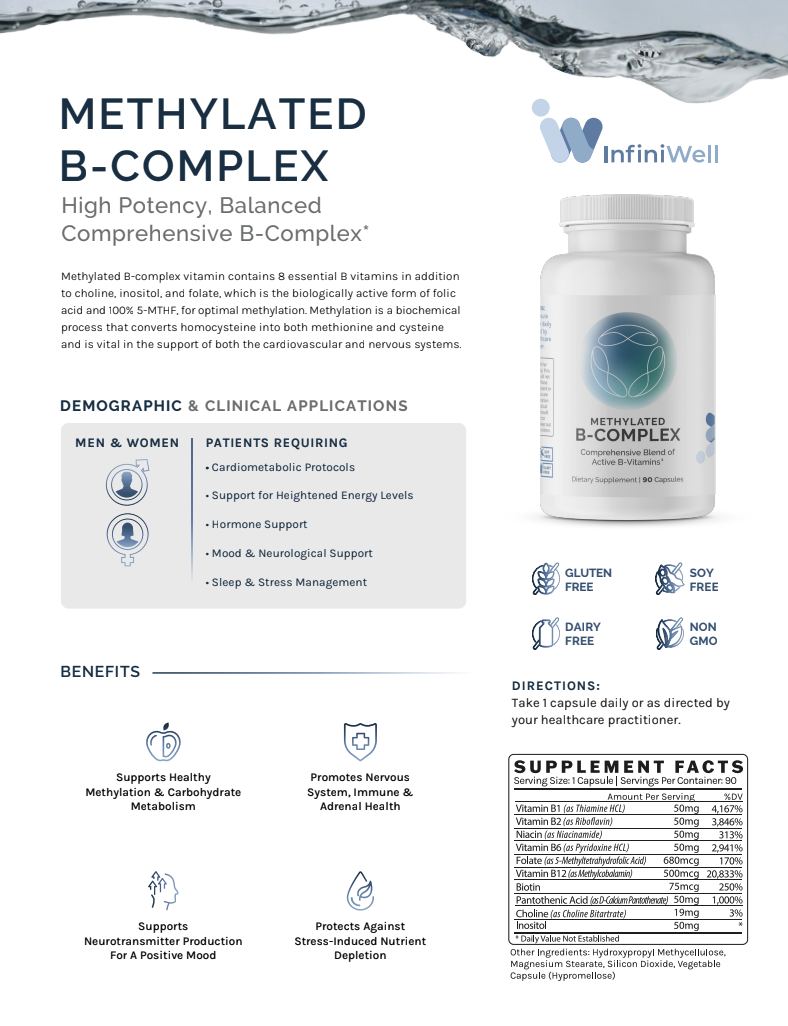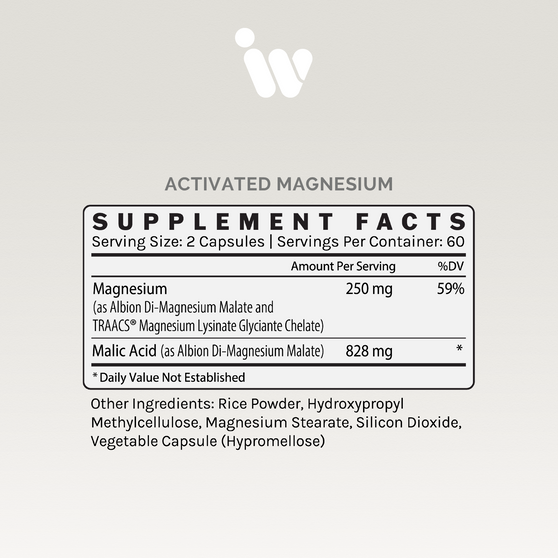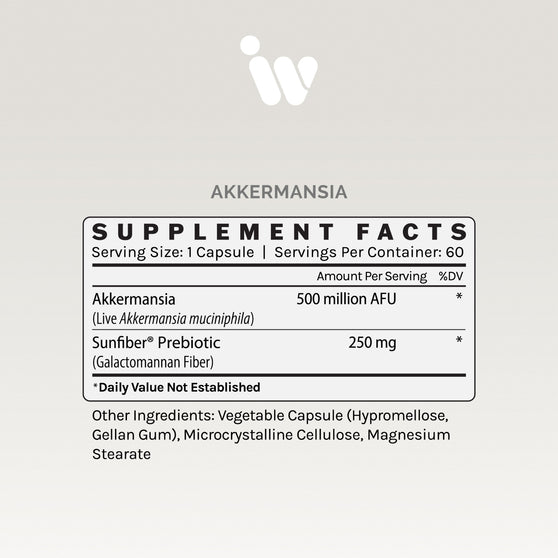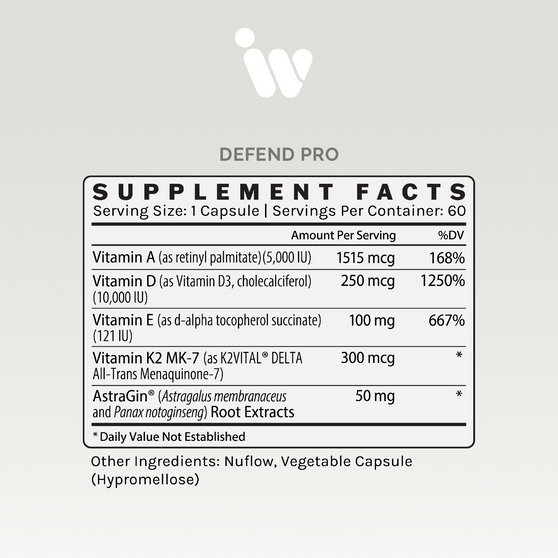COMPLEJO B METILADO
High Potency, Comprehensive B-Complex*
- Supports Healthy Methylation & Carbohydrate Metabolism
- Promotes Nervous System, Immune & Adrenal Health
- Supports Neurotransmitter Production For A Positive Mood
- Protects Against Stress-Induced Nutrient Depletion
Active Ingredients: Thiamine (Vitamin B1), Riboflavin (Vitamin B2), Niacin, Vitamin B6, Folate, Vitamin B12, Biotin, Pantothenic Acid, Choline Bitartrate, Inositol
Other Ingredients: Hydroxypropyl Methycellulose, Magnesium Stearate, Silicon Dioxide, Vegetable Capsule (Hypromellose)
Take 1 capsule daily or as directed by your healthcare practitioner.
Daily
1 Capsule
-
Benefits
- Supports Healthy Methylation & Carbohydrate Metabolism
- Promotes Nervous System, Immune & Adrenal Health
- Supports Neurotransmitter Production For A Positive Mood
- Protects Against Stress-Induced Nutrient Depletion
-
Ingredients
Active Ingredients: Thiamine (Vitamin B1), Riboflavin (Vitamin B2), Niacin, Vitamin B6, Folate, Vitamin B12, Biotin, Pantothenic Acid, Choline Bitartrate, Inositol
Other Ingredients: Hydroxypropyl Methycellulose, Magnesium Stearate, Silicon Dioxide, Vegetable Capsule (Hypromellose)
-
How To Use
HOW
Take 1 capsule daily or as directed by your healthcare practitioner.
WHEN
Daily
DOSE
1 Capsule
COMPLEJO B METILADO
High Potency, Balanced Comprehensive B-Complex*
-
METHYLATED B-COMPLEX
This advanced B-complex formulation includes eight essential B vitamins along with choline, inositol, and biologically active folate as 5-MTHF for optimal methylation. Methylation is a critical biochemical process that converts homocysteine into methionine and cysteine, supporting cardiovascular and nervous system health.*
-
OVERVIEW
B vitamins are essential for the body’s ability to convert food into cellular energy. These water-soluble vitamins are absorbed in the small intestine and metabolized in the liver into their active coenzyme forms. Acting as coenzymes in the Krebs cycle, they are vital for the production of adenosine triphosphate (ATP), the body’s primary energy currency. Moreover, B vitamins like folate, B6, and B12 play pivotal roles in methylation, a process crucial for converting homocysteine into methionine and cysteine. Methylation influences DNA repair, gene expression, and overall mental and physical health.*
-
FUNCTIONS OF EACH ESSENTIAL B VITAMIN
Thiamine (Vitamin B1)
Thiamine is a key cofactor in A TP production within the Krebs cycle and is required for metabolizing fats, proteins, and carbohydrates. Modern diets often lack sufficient thiamine due to the over-processing of grains. Research from randomized, double-blind, placebo-controlled trials indicates that high-dose thiamine supplementation may also support balanced blood sugar levels.1*
Riboflavin (Vitamin B2)
Riboflavin serves as a precursor for flavin adenine dinucleotide (FAD) and flavin mononucleotide (FMN), critical for energy production and antioxidant activity. Riboflavin deficiency can lead to oxidative stress and impaired energy production. Studies suggest that maintaining optimal riboflavin levels can help promote healthy blood pressure, especially in genetically predisposed individuals.2*
Niacin (Vitamin B3)
Niacin, transformed into NAD and NADP in the body, is a cofactor in mitochondrial energy production. It supports oxidation-reduction reactions and promotes cardiovascular health, with substantial evidence demonstrating its role in maintaining healthy cholesterol levels.3*
Vitamin B6
With involvement in over 100 enzymatic reactions, B6 is vital for lipid metabolism, neurotransmitter production, immune function, and hormone regulation. Studies show that higher dietary intake of B6 supports cardiovascular health and enhances lymphocyte activity, promoting immune function in older adults.4,5*
Folate (5-MTHF)
Folate is indispensable for DNA synthesis, methylation, and mitochondrial energy metabolism. Unlike folic acid, which requires enzymatic conversion, 5-MTHF is bioactive and readily utilized by the body. This ensures better folate absorption, particularly in individuals with suboptimal enzyme activity. Folate also supports neural tube development during pregnancy and overall cellular function.*
Vitamin B12
Essential for fat and carbohydrate metabolism, protein synthesis, and mitochondrial energy regulation, B12 is primarily found in animal-based foods. This nutrient supports neurological health, mood, and energy production. V egan and vegetarian diets often lack adequate B12, making supplementation critical.6*
Biotin
Biotin is vital for the metabolism of fats, carbohydrates, and proteins, playing a key role in cellular processes and macromolecule synthesis. It is also associated with promoting healthy hair strength and growth6,7*
Pantothenic Acid (Vitamin B5)
Pantothenic acid and its active form, CoA, are essential for synthesizing fatty acids, phospholipids, amino acids, and steroid hormones. Approximately 95% of CoA resides in mitochondria, underscoring its role in energy production. Research highlights pantothenic acid’s ability to support tissue repair and regulate blood lipids.8,9,10*
Choline Bitartrate
Although not a B vitamin, choline is critical for forming cellular membranes and lipoproteins. It also synthesizes acetylcholine, a neurotransmitter vital for brain and muscle function. Choline supports cognitive health and cellular integrity.* -
REFERENCES
1. Alaei Shahmiri F, Soares MJ, Zhao Y, Sherriff J. Eur J Nutr. 2013 Oct;52(7):1821-4. Epub 2013 May 29.
2. Wilson CP, Ward M, McNulty H, Strain JJ, Trouton TG,Horigan G, Purvis J, Scott JM. Am J Clin Nutr. 2012 Mar;95(3):766-72. Epub 2012 Jan 25.
3. Mason CM, Doneen AL. J Cardiovasc Nurs. 2012 Jul-Aug;27(4):303-16.
4. Rimm EB, Willett WC, Hu FB, et al. JAMA. 1998;279(5):359-364.
5. Meydani SN, Ribaya-Mercado JD, Russell RM, Sahyoun N, Morrow FD, Gershoff SN. Am J Clin Nutr. 1991;53(5):1275-1280.
6. Huskisson E, Maggini S, Ruf M. J Int Med Res. May-Jun 2007;35(3):277-289.
7. Mock DM. Biotin. In: Ziegler E, Filer LJ, eds. Present Knowledge in Nutrition: International Life Sciences Institute; 1996:220-235.
8. Plesofsky-Vig N. Pantothenic Acid. In: Ziegler E, Filer LJ,eds. Present Knowledge in Nutrition: International Life Sciences Institute.; 1996:236-244.
9. Naruta E, Buko V. Exp Toxicol Pathol. 2001 Oct;53(5):393-8.
10. Ellinger S, Stehle P. Curr Opin Clin Nutr Metab Care. 2009 Nov;12(6):588-95. Review.
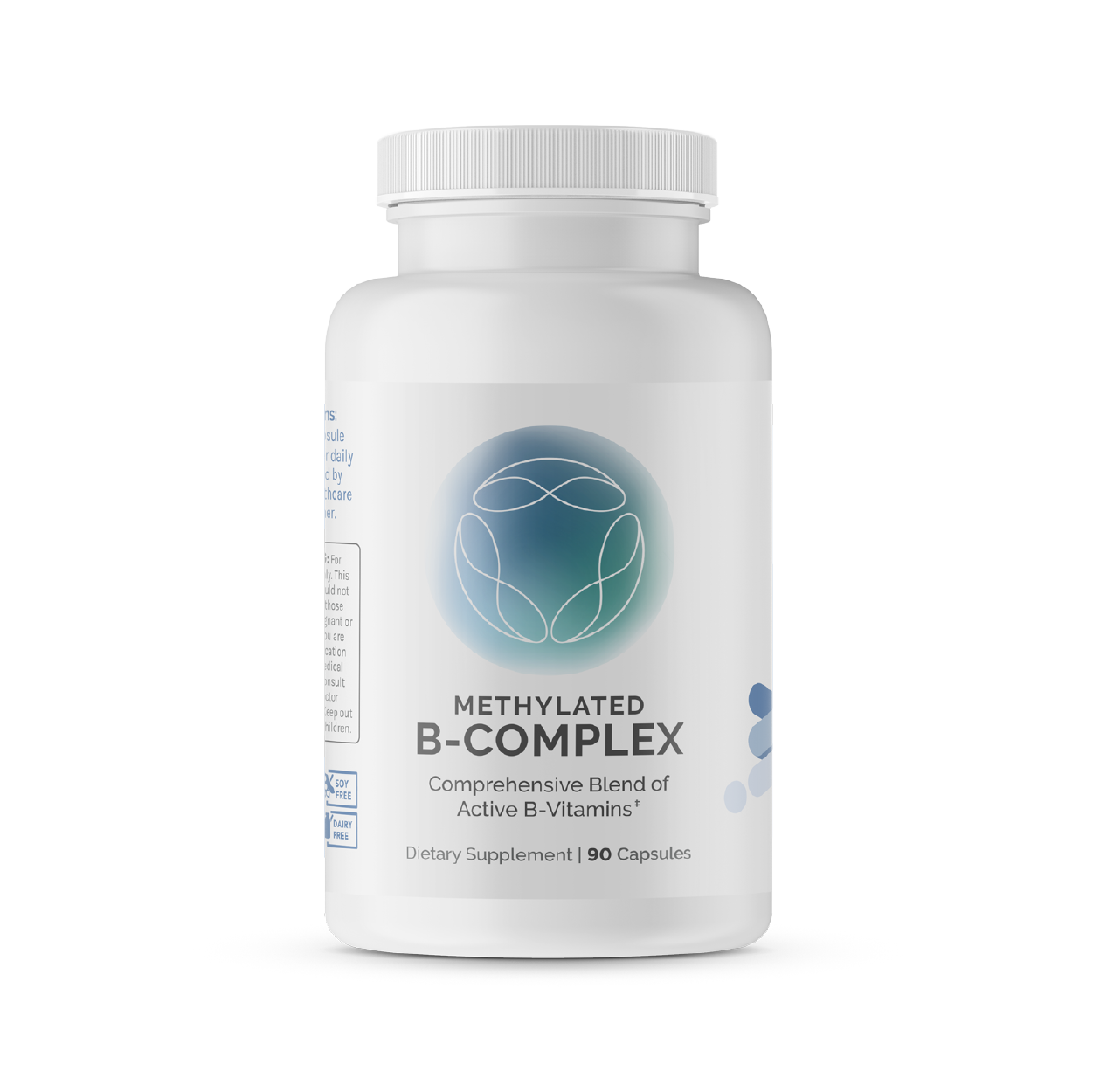
| Ingredients | Amount Per Serving |
| Vitamin B1 (as Thiamine HCL) | 50 mg |
| Vitamin B2 (as Riboflavin) | 50 mg |
| Niacin (as Niacinamide) | 50 mg |
| Vitamin B6 (as Pyridoxine HCL) | 50 mg |
| Folate (as 5-Methyltetrahydrofolic Acid) | 680 mcg |
| Vitamin B12 (as Methylcobalamin) | 500 mcg |
| Biotin | 75 mcg |
| Pantothenic Acid (as D-Calcium Pantothenate) | 50 mg |
| Choline (as Choline Bitartrate) | 19 mg |
| Inositol | 50 mg |
Other Ingredients: Hydroxypropyl Methycellulose, Magnesium Stearate, Silicon Dioxide, Vegetable Capsule (Hypromellose)
Professional Information
People Requiring:
-
Cardiometabolic Protocols
-
Support for Heightened Energy Levels
-
Hormone Support
-
Mood & Neurological Support
-
Sleep & Stress Management
Methylated B Vitamin Complex: FAQs
Have more questions? We have answers
InfiniCare—your personal concierge for longevity. Our team of experts, including our on-staff physician, are standing by to ensure world-class service.
Our team is located in Dallas, TX, USA
-
What is methylation, and why is it important?
Methylation is a vital biochemical process that affects nearly every system in the body. It helps regulate how your body functions by influencing:- Gene expression: Controls which genes are turned on or off
- DNA repair: Helps fix damaged cells to maintain genetic stability
- Neurotransmitter production: Supports the creation of mood-regulating brain chemicals like serotonin and dopamine
- Detoxification: Assists in breaking down and removing harmful substances from the body
- Cardiovascular health: Helps convert homocysteine into methionine, which may support heart and blood vessel health by reducing elevated homocysteine levels linked to cardiovascular problems
-
What is a methylated B-vitamin complex?
More commonly known as methylated B-complex, this B vitamin supplement contains active, bioavailable forms of B vitamins such as methylfolate (L-5-MTHF) and methylcobalamin (B12)—meaning the body can use them directly without needing to convert them. It supports methylation, a biochemical process that regulates gene expression, neurotransmitter synthesis, and cellular energy production.InfiniWell’s Methylated B-Complex formula uses these active forms to support better absorption and performance, especially in people with reduced methylation capacity. -
What does methylated B-complex do?
A methylated B-complex contributes to several essential functions that support everyday health:- Support energy production at the cellular level
- Maintain a healthy nervous system and overall neurological health
- Produce mood-regulating neurotransmitters for emotional balance and brain function
- Support mental and cardiovascular health through proper methylation
- Promote immune health and adrenal function
- Replenish B vitamins commonly lost to dietary deficiencies, poor absorption, or high-stress lifestyles
-
How is InfiniWell’s Methylated B-Complex different from standard B-complex vitamins?
Unlike standard B-complex supplements that often use synthetic forms like folic acid or non-methylated B12, InfiniWell’s Methylated B-Complex delivers all eight essential B vitamins in a high-potency, balanced formula—along with choline, inositol, and biologically active folate (5-MTHF) for optimal methylation support.This advanced formulation includes:
- 5-MTHF (methylated folate) and methylcobalamin (B12): To support methylation, an essential biochemical pathway that converts homocysteine into methionine and cysteine, amino acids that are important for cardiovascular and nervous system health
- Vitamins B6 and B2: To help maintain energy production, support antioxidant function, and promote neurological health
- Choline and inositol: To nourish nerve cells, support neurotransmitter production, and promote brain development and cognitive function
Many standard formulas use folic acid, a synthetic form that requires enzymatic conversion before the body can use it. InfiniWell’s formula skips that step by using active coenzyme forms, which may be better absorbed, particularly in individuals with gene-related limitations like MTHFR variants.
If you’re unsure whether a methylated B vitamin complex is right for you, it’s a good idea to talk to a health care professional, especially if you have known nutrient deficiencies, genetic variations, or are following a supplement regimen.
This methyl B complex supports cardiovascular and mental health, nourishes the nervous system, and replenishes key nutrients, even in the face of oxidative stress or dietary deficiencies. -
Is this supplement good for energy?
Yes. B vitamins are essential co-factors in the body’s energy metabolism. They help convert carbohydrates, fats, and proteins into adenosine triphosphate (ATP), the molecule that stores and delivers energy at the cellular level.Methylated B vitamins make this process more efficient by skipping steps the body might struggle with due to genetic or enzyme limitations.
InfiniWell’s formula supports steady, natural energy without relying on caffeine or stimulants. -
How does this supplement support mental health and cognitive function?
Methylated B vitamins help produce neurotransmitters like serotonin, dopamine, and norepinephrine—chemicals that regulate mood, focus, and emotional balance. They also support nervous system health and help maintain proper synaptic function.Low B vitamin levels may contribute to mental fatigue. InfiniWell's Methylated B-Complex helps rebuild your micronutrient reserve to support mood and focus over time. -
How does this supplement support cellular energy and metabolic function?
B vitamins are essential for energy metabolism. They help convert carbohydrates, fats, and proteins into ATP through the mitochondrial respiratory chain, the body’s primary system for generating energy at the cellular level. Low levels of B vitamins can disrupt energy generation, leaving you feeling sluggish or mentally foggy.InfiniWell’s formula includes coenzyme forms that help regulate mitochondrial enzymes (proteins that drive energy production in cells), activate nutrients like folate, and support nerve cell function. Nutrients like choline and B5 also support the metabolism of fatty acids, which your body uses for long-term fuel. -
Who should consider using a methylated B-complex supplement?
This supplement may be helpful for:Adults dealing with stress, irregular sleep, or gaps in their diet
Ongoing stress, inconsistent sleep, and poor dietary habits can deplete B vitamin stores over time. A daily supplement can help replenish your micronutrient reserve and support mental clarity.
Individuals experiencing low energy, brain fog, or mood changes
These may signal low B vitamin levels. Methylated B vitamins support cellular energy, mood balance, and brain function—especially when diet, stress, or lifestyle create nutritional gaps.
People with genetic variations (such as MTHFR)
Certain gene variants may limit the body’s ability to convert standard folic acid into its usable form. A methylated B-complex provides nutrients in active forms the body can use right away.
Those following vegan and vegetarian diets with limited B12 intake
Since vitamin B12 is mainly found in animal products, people following vegan or vegetarian diets may benefit from supplementation to support energy and neurological health. -
Is InfiniWell’s Methylated B-Complex safe for daily use?
Yes—when taken as directed. InfiniWell’s formula is intended for regular use and contains no synthetic additives or folic acid. As always, consult your healthcare provider if you’re taking medications or managing a medical condition. -
When should I take Methylated B-Complex?
Take 1 capsule daily with or without food. For best results, take in the morning to support daytime energy and mood. If you’re taking other supplements or medications, ask your healthcare provider about the best timing. -
What are the ingredients in Methylated B-Complex?
Active ingredients:- Thiamine (vitamin B1): Supports carbohydrate metabolism and nervous system function
- Riboflavin (vitamin B2): Helps produce cellular energy and supports antioxidant activity
- Niacin (vitamin B3): Aids in energy production and supports cardiovascular health
- Vitamin B6 (as pyridoxal-5-phosphate): Supports mood, hormone balance, and immune function
- Folate (as L-5-MTHF): Promotes methylation, DNA synthesis, and prenatal health
- Vitamin B12 (as methylcobalamin): Supports red blood cell production, brain function, and energy metabolism
- Biotin (vitamin B7): Aids in the metabolism of fats, carbs, and proteins; supports healthy hair and skin
- Pantothenic acid (vitamin B5): Essential for hormone production and energy metabolism
- Choline bitartrate: Supports brain development, nerve signaling, and liver function
- Inositol: Helps regulate mood and supports nerve signaling and cell membrane health
- Hydroxypropyl methylcellulose: Used to create the plant-based capsule shell
- Magnesium stearate: A flow agent that ensures even distribution of ingredients during manufacturing
- Silicon dioxide: Prevents clumping and keeps the powder dry and stable
- Vegetable capsule (hypromellose): A cellulose-based capsule
-
How does this formula support cardiovascular health?
B vitamins support homocysteine metabolism, a process critical to cardiovascular function. Elevated homocysteine levels—often linked to genetic variations or poor methylation—may impact heart health. This formula includes activated B6, folate, and B12 to support normal homocysteine levels and cardiovascular wellness. -
How can I get B vitamins through food?
B vitamins are naturally abundant in many whole foods. You can find different B vitamins in:- Dark leafy vegetables like spinach, kale, and collard greens (rich in folate)
- Whole grains and legumes (sources of thiamine, niacin, and pantothenic acid)
- Eggs, dairy, poultry, and red meat (sources of B12, B6, and riboflavin)
- Nuts, seeds, and avocados (contain biotin and B6)
- Fish and other fatty protein sources (help supply B12 and support metabolism of fatty acids)
-
What if I have dietary restrictions?
InfiniWell’s Methylated B-Complex is suitable for most dietary lifestyles. It contains no dairy, gluten, soy, or artificial colors. It’s also a good choice for vegans and vegetarians who may need extra vitamin B12. If you have specific dietary needs or health concerns, check with your doctor or nutritionist before adding any supplement to your routine. -
Glossary
Key terms to know:- B complex methylated: A supplement containing B vitamins in their activated (methylated) forms, which the body can use without conversion. Often recommended for individuals with methylation-related genetic limitations.
- Coenzyme forms: Biologically active versions of vitamins that the body can use immediately, without needing to convert them through enzymatic processes.
- Energy metabolism: The body’s process of converting carbohydrates, fats, and proteins into cellular energy (ATP), primarily through the mitochondrial respiratory chain.
- Genetic factors: Inherited traits that can affect how efficiently the body processes nutrients, including the ability to activate certain B vitamins.
- Greater oxidative stress: A state in which the body’s antioxidant defenses are overwhelmed by free radicals, potentially increasing nutrient demands, especially for B vitamins that support mitochondrial and nervous system health.
- Lipid metabolism: The process by which the body breaks down and uses fats for energy, hormone production, and cellular maintenance—supported in part by vitamins like B5 and choline.
- Methylated B vitamins: Activated forms of B vitamins that don’t require enzymatic conversion. Common examples include methylcobalamin (B12) and L-5-MTHF (folate).
- Methylation: A biochemical pathway that regulates gene activity, detoxification, neurotransmitter production, and cardiovascular health.
- MTHFR gene mutation: A genetic variation that may impair the body's ability to convert folic acid to its usable form, making methylated folate more appropriate for some individuals. May be identified through genetic testing.
- Neurotransmitters: Brain chemicals such as serotonin, dopamine, and norepinephrine that regulate mood, focus, and stress response.



